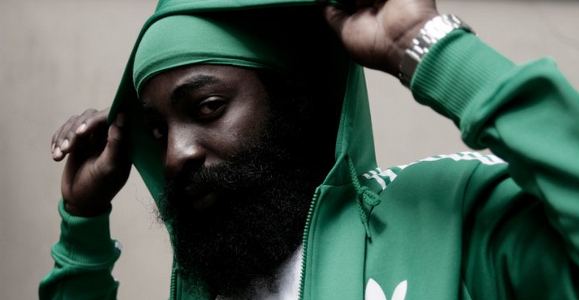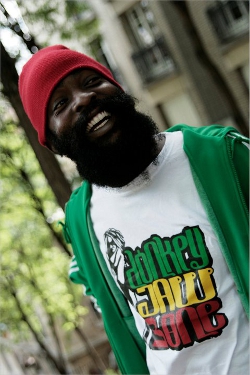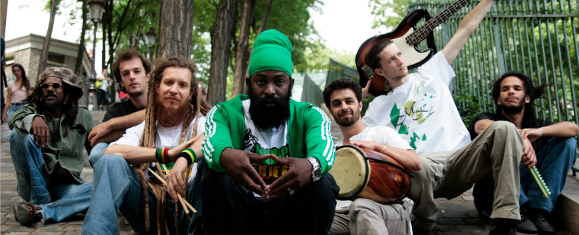Articles about reggae music, reviews, interviews, reports and more...
Interview: Derajah
- Home
- Articles
- Interviews
- Interview: Derajah

Interview: Derajah
"I didn't know where in the music I wanted to be, I just knew I wanted to be a part of it"
Sampler
Derajah Mamby was born in East Kingston in Rollington Town but moved back and forth between the two sides of the capital, spending some of his formative years on the musical hotspot (immortalized by Bim Sherman in song) Chancery Lane. His father was a Rastafarian while his mother was a church-going Christian, an upbringing which not only allowed the young Derajah an equal amount of exposure to both secular and sacred music but also provided a supportive environment of acceptance to follow his own spiritual path. Recorded and encouraged by Sugar Minott in the early 2000s his first real break came when he was introduced to Earl Chinna Smith and joined the legendary guitarist’s acoustic collective Inna De Yard. The group's releases through French label Makasound gave Derajah a profile in France, helped by the release of the David Commeillas documentary 'Natural Mystic Reggae' where he sang My Sister, the harrowing tale of his sister's murder by gunmen. In 2007 he linked up with the French backing band Donkey Jaw Bone and began work on his debut album, 'Paris Is Burning', whose issue was postponed when Makasound went into administration. The record, cut at Donkey Jaw Bone's analogue-only studio in Paris represents a unique blending of different eras of roots music. Angus Taylor spoke to Derajah as he was preparing for its eagerly anticipated release on the label that rose from Makasound’s ashes, Chapter Two.

When you were young did you want to be a deejay or a singer?
When I was young I didn't know where in the music I wanted to be, I just knew I wanted to be a part of it. The sound system coming out and playing, the fashion and the style and the people, them coming out for the dance. Even if it was being in producing or involved in promotion. I was just wanting to be a part of all of that. I can remember recording my first song in my house. I had a recorder and a tape player, a music box. So I'd take my tape inside the bathroom and I'd put a cassette inside the tape player and play the rhythm from the tape and then the recorder that I had, I'd capture everything on it. That was my first recording before going into studio. I got a reverb sound and everything coming back and when I was listening to it I was like "Oh, this is amazing. I need to take this further, I need to go in a studio with this".
How did you link with Chinna and join Inna De Yard?
I was living downtown on Chancery Lane. My brethren used to work in Augustus Pablo's record shop and Augustus Pablo's brother, his name is Garth, he's a good friend of mine. Sometimes I would go to the record shop and freestyle while my friend played the version in the shop and me and him would vibe and thing. One day my brethren came by and said to me "Derajah, I need to take you to meet one of my brethren, a good musician. He played with Bob Marley and he played with all the legends, the great singers." So we left and went straight to Chinna Smith's yard where he was playing music on his veranda. He was playing the type of music that I wanted to hear. As I heard his guitar play I started to sing and everything was so connected because he was going deeper inside of what he was doing and I was going even more higher in what I was singing and I noticed that tears were running from my eyes and I'm like "Wow! This moment is magical!" The rest is history. It all started right there.
 I've heard brethrens making songs and just talking about his ride and his girls. He don't even own a car
I've heard brethrens making songs and just talking about his ride and his girls. He don't even own a car
You originally took the name Jah Youth when you released with Inna De Yard project but then you changed your name back to your own name.
Since I came into music I've been called Jah Youth. I remember one morning when I was living in east Kingston, close to Rockfort I hailed an elder and he was like "Yes, Jah Youth, wha gwaan". As a young Rasta in those times I felt special because the name Jah Youth came to me by this elder. Then when I went downtown now, my family and friends were already friends with Big Youth, which is the original Jah Youth. So they take me to meet Big Youth and say "Big Youth! Come and meet Jah Youth". Big Youth held onto my hand and he said to me "I am Jah Youth also" and shakes my hand and laughs. But putting out songs I didn't want the name to create any confusion. My cousin always looked at me and told me that "Derajah, you know your name is a very powerful name, man. It is very distinct and there isn't another artist who goes by that name Derajah. You should use it on your records".
Since then you've sung under your own name and you've been very honest in your lyrics, particularly in talking about people dear to you that you've lost. Would you say that being real, not just being a performance, is part of what you do?
 I've always been real to the music because I can tell you that music to me is my life, my upbringing, my growing up. Music is everything to me. Here in Jamaica, I've heard brethrens making songs and just talking about his ride and his girls and some of these things that they are singing about, it is not actually what is happening in their life. He don't even own a car. I become more real because I think that the realer I get, the more you get connected with persons because we are dealing with real life situations. I know that persons share the same pain, share the same earth. We all share so much in common. So I just decided to keep it real and just be real for me.
I've always been real to the music because I can tell you that music to me is my life, my upbringing, my growing up. Music is everything to me. Here in Jamaica, I've heard brethrens making songs and just talking about his ride and his girls and some of these things that they are singing about, it is not actually what is happening in their life. He don't even own a car. I become more real because I think that the realer I get, the more you get connected with persons because we are dealing with real life situations. I know that persons share the same pain, share the same earth. We all share so much in common. So I just decided to keep it real and just be real for me.
Do you think that's a part of why your music has been so warmly received in Europe, for example?
Well, to be honest with you yes. I remember that my brethren was saying to me that "Derajah, do you think that your material is a little too heavy?" and I was saying to him that I understand what he was saying and maybe it is a little bit too heavy, maybe it's not, you understand? It's just what the people want to hear. But yes of course, being real you are more accepted, being real, not just as an artist but in everything that you do.
 Being real you are more accepted, not just as an artist but in everything that you do
Being real you are more accepted, not just as an artist but in everything that you do
Tell me a bit about how you made the link with the band Donkey Jaw Bone, in Kingston, and started recording at Tuff Gong.
I remember one day, a couple of years ago, I was going through my messages on MySpace and when I noticed some guys from France were saying to me "Oh Derajah, we love your music and you are doing something great. We're a band from France and we'd love to get in touch with you, if possible do some work". So from there we keep communicating and communicating and the guys decide that they are going to come to Jamaica to see me. I was saying to them "It's more appropriate for you guys to come down. Come feel the reggae vibe and come check out what's happening on the island". They came and I took them to Earl Chinna Smith's place and introduced them to Earl Chinna Smith. Earl Chinna Smith was saying to me "Ok Derajah, this means that you are going to make the next step towards this mission. These guys they really like you. They like your style, they like your vibe. They are here to work with you".
The album was finished off in an analogue studio with vintage equipment. Is that something you approve of?
Yes, I do because to be frank with you I'm coming from a school where we really appreci-love analogue sound deeply. Working with Chinna Smith for all these years I've learned a lot about sound and what brings you back in time and you know, the equipment that can give you that sound. So these guys they were already in analogue sound, they were already where I was, so it was even much easier for them and me to connect together as a team. For instance we were using acoustic pianos and stuff like that. It's something that we really, deeply appreci-love and that we're working with for quite some time, we keep the sound a certain way.

You made a new cut of the tune Who Yeah Yah that you did with the Inna Di Yard project. It's been given away as a free download to promote the album. Is that the way to make an album sell to people in this age? What do you think about the way the internet has changed the music business?
I've seen that a lot. A lot of record shops are no more on the mall or on the plazas, they are now online. You used to be able to walk into record stores and get different songs and stuff like that, now it's more online. It's good and it's bad, and I think good and bad is what makes life go on because it is actually a balance. The good is that, of course, persons can easily access the songs and millions of persons can easily access the songs a click away. The bad thing is that after you do such an investment in paying musicians and paying studio time and paying those girls to sing so nice the harmonies and stuff like that, after all of this there is still a site that is doing your songs and offering your songs to the public for free and they don't pay a penny for it. But money is still making in the music, and we do the music more for arts and the best thing is getting the music out, so the good and the bad just balance the scale for us. We really appreci-love everything that's happening, both good and bad.
 The government need to set up a ganja trade right now for the youths
The government need to set up a ganja trade right now for the youths
Finally, you sing a lot about violence and how it has affected you personally. What do you see as the way forward for Jamaican society?
I'd like to see them look out more for the youths of tomorrow because the youths are the future. I create great emphasis on education because education is most valid. It's what's going to take us further, take the next generation further. I'd like to see the youths in Jamaica get a proper education. I'm talking about even my youth coming up right now, I'd like these youths to be properly educated so that they can take Jamaica further on and make Jamaica a better Jamaica and the world a better world at large. Agriculture just the same. The government they're fighting against marijuana and we see where marijuana is doing a lot, not just smoking purpose but medicinally, marijuana has been helping in the pharmaceutical department, marijuana has been helping in different areas. The government need to set up a ganja trade right now for the youths to plant marijuana and they can export it for proper usage. I've been to Holland and I've seen it's not such a crime for us to smoke marijuana in because the president's made sure he's set up something to facilitate the use of marijuana. For a land like Jamaica, where herb is from, the best herb can be found here. It would have been good for Jamaica to set up a ganja trade, so that we can use hemp in different ways to make shoes, clothes, cologne, oil, all this different stuff that it can be used for, instead of fighting against marijuana. Of course, I don't have a problem with the prime minister or whoever else is coming, but just make preparation for the youths because the youths are the future. One love.
Comments actually desactivated due to too much spams
Browse by categories
Recommended Articles
Latest articles
Recently addedView all
© 2007-2026 United Reggae. All Rights Reserved. Reproduction in whole or in part is prohibited. Read about copyright
Terms of use | About us | Contact us | Authors | Newsletter | A-Z














